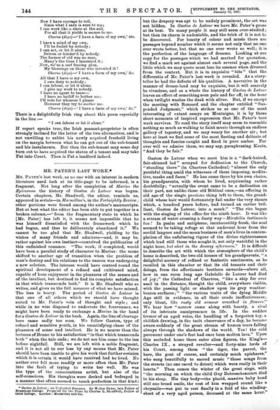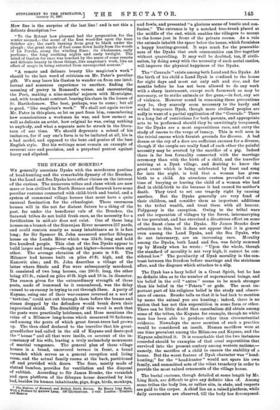MR. PATER'S LAST WORK.*
MR. PATER'S last work, as no one with an interest in modern literature need look at its title-page to be informed, is a fragment. Not long after the completion of Marius the Epicurean the history of Gaston de Latour was begun. Certain chapters, Mr. Shadwell, the editor, reminds us, appeared in serials—in Macmillan's, in the Fortnightly Review ; other portions were found among the author's manuscripts. But at beet what the editor has been able to put together is a broken column,—" from the fragmentary state in which he [Mr. Pater] has left it, it seems not impossible that he was himself dissatisfied with the framework which he had begun, and that he deliberately abandoned it." We cannot be too glad that Mr. Shadwell, yielding to the wishes of many friends and admirers—and, it may be, rather against his own instinct—contrived the publication of this unfinished romance. "The work, if completed, would have been a parallel study of character to Marina: the scene shifted to another age of transition when the problem of man's destiny and his relations to the unseen was undergoing a new solution. The interest would have centred round the spiritual development of a refined and cultivated mind, capable of keen enjoyment in the pleasures of the senses and of the intellect, but destined to find its complete satisfaction in that which transcends both." It is Mr. Shadwell who so writes, and gives us the full measure of what we have missed. The loss is heavy. The period of Gaston de Latour is that one of all others which we should have thought suited to Mr. Pater's vein of thought and style ; and while in no wise disposed to underrate the forerunner, we might have been ready to exchange a Marius in the hand for a Gaston de Latour in the bush. Again, the line of cleavage here came sadly too soon. We follow Gaston, type of refined and sensitive youth, in his unsatisfying chase of the pleasures of sense and intellect. He is no nearer than the lectures of Bruno to his satisfaction "in that which transcends both" when the tale ends ; we do not see him come to the inn before nightfall. Still, we are left with a noble fragment, and it is not all to our loss by any means that Mr. Pater should have been unable to give his work that further revision which it is certain it would have received had he lived. No author ever fell more readily or more often than Mr. Pater into the fault of trying to write too well. He was the type of the conscientious artist, but also of the self-conscious. His thoughts were decked and bedraped in a manner that often seemed to touch perfection in that kind ; • Gaston de Latour : an Unfinished Romance. By Wdter Pater, late Fellow of Brasenose College. Prepaned for the Press by Charles L, Sh *dwell, Fellow of Oriel Oollege. London : Macmillan and Co. but the drapery was apt to be unduly prominent, the art was not hidden. In Gaston de Latour we have Mr. Pater's prose at its best. To many people it may still seem over-studied ; but then its charm is undeniable, and the trick of it is not to be discovered. For beauty of colour and music there are passages beyond number which it seems not only that no one ever wrote better, but that no one ever wrote so well ; it is the perfection of the language of dreams. Looking at our copy for the passages which we had marked for quotation, we find a mark set against almost each several page, and the little which we may quote must lose its essence when divorced from the context. But it is in exquisite " bits " that the differentia of Mr. Pater's last work is revealed. As a story- teller he had the defects of his qualities. A narrative in the manner of dream-land may be exquisite, but it will scarcely be vivacious, and as a whole the history of Gaston de Latour leaves an effect of something seen pale and far off, in the hour when twilight washes the dusk with silver. But, if we except the meeting with Ronsard and the chapter entitled "Sus- pended Judgment," which strikes us as one of the most interesting of extant essays on Montaigne, it is by those short moments of inspired expression that Mr. Pater's best work survives. To read the story itself may seem to resemble nothing so much as walking to faint music through an endless gallery of tapestry, and we may weary for another air ; but here at least we find some of the most fleeting and delicate of thoughts and fancies caught and fixed in pare amber. For ever will we admire them, we may say, paraphrasing Keats, "And they be fair."
Gaston de Latour when we meet him is a "dark-haired, fair-skinned lad" arrayed for dedication to the Church, "standing there" (in Chartres Cathedral) "almost the only youthful thing amid the witnesses of these imposing, medita- tive, masks and faces." He has come there by his own choice, his grandparents, with whom be lived, acquiescing rather doubtfully; "actually the event came to be a dedication on their part, not unlike those old Biblical ones,—an offering in old age of the single precious thing left to them, the grand- child whose hair would fortunately fall under the very shears which, a hundred years before, had turned an earlier bril- liant, Gaston de Latoar, into a monk." "The rite began with the singing of the office for the ninth hour. It was like a stream of water crossing a dusty way—Iltirabilia testimonia tut! In psalm and antiphone, inexhaustibly fresh, the soul seemed to be taking refuge at that nndevout hour from the sordid languor and the mean business of men's lives in contem- plation of the unfaltering vigour of the divine righteousness which lead still those who sought it, not only watchful in the night hoar, but alert in the drowsy afternoon." It is difficult to describe the art with which the atmosphere of the child's home is described, the two old houses of his grandparents, "a delightful nursery of refined or fantastic sentiments, as he recalled in this chamber or that its old tenants and their doings, from the affectionate brothers onwards—above all, how in one room long ago Gabrielle de Latour had died of joy;" the Cathedral of Chartres, "like a ship for ever asail in the distance, thought the child, everywhere visible, with the passing light or shadow upon its grey weather- beaten surfaces ; " "the various traits of the dying Middle Age still in evidence, in all their crude ineffectiveness ; only blunt, like rusty old armour wreathed in flowers." We hear how "sorrow came along with beauty, a rival of its intricate omnipresence in life. In the sudden tremor of an aged voice, the handling of a forgotten toy, a childish drawing, in the tacit observance of a day, he became aware suddenly of the great stream of human tears falling always through the shadows of the world. Yes ! the cold pavement under one's feet had once been molten lava." Upon this secluded home there enter alien figures, the King's— Charles IX, a strayed reveller—and forty-nine lords of his Court, among them "the tiger, the parrot, the hare, the goat of course, and certainly much apishness," who sang beautifully to sacred music "those songs from the streets (no one cared to detect) which were really in their hearts." Then comes the winter of the great siege, with "the morning on which the child Guy Debreschescourt died in his sleep. His tiny body—the placid, massive baby head still one broad smile, the rest of him wrapped round like a chrysalis—was put to rest finally in a fold of the winding sheet of a very aged person, deceased at the same hour."
How fine is the surprise of the last line ! and is not this a delicate description ?—
" To the Robust how pleasant had the preparation for the winter seemed,— the scent of the first wood-fire upon the keen October air; the earth turning from grey to black under the plough ; the great stacks of fuel came down lazily from the woods of La Perche, along the winding Euse it wholesome, early perfume ; the long soothing nights and early twilight. The mind of Gaston for once was touched by the sense of some remote and delicate beauty in these things, like magician's work, like an effect of magic in being extorted from unsuspected sources."
"A remote and delicate beauty like magician's work" should be the last word of criticism on Mr. Pater's peculiar gift. We may leave his Gaston to wander on from one intel- lectual and sensuous experience to another, finding the meaning of poetry in Ronsard's verses, and encountering the Poet, making a nine-months' sojourn with Montaigne, and, with trenchant contrast, bearing his share in the losses of St. Bartholomew. The best, perhaps, was to come ; but all is good, "like magician's work." We shall not again review Mr. Pater in this place, so let us part from him, remembering how conscientious a workman he was, and how earnest as well as delicate an artist, how original he was, owing nothing to anybody, and what a separate note he struck in the litera- ture of our time. We should deprecate a school of his imitators, for if any one's form is to be imitated at all, his is a bad model, and opposed to the bent and genius of the best English style. But his writings must remain an example of reverent care and precision, and a perpetual protest against hurry and slipshod.



















































 Previous page
Previous page